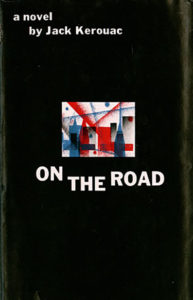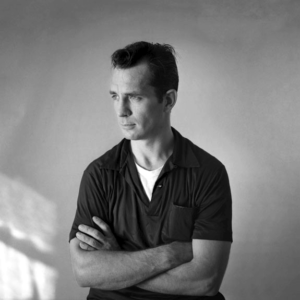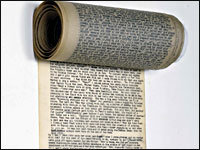by James Scott Bell
@jamesscottbell
We’ve written about Robert A. Heinlein’s rules and Elmore Leonard’s rules. Are you ready for Jack Kerouac’s?
Like most college liberal arts guys in the 70s, I went through a big Kerouac phase. It started, of course, with On the Road, the slightly fictionalized account of Kerouac’s roamings in post-World War II America.
There’s a myth that Kerouac completed his most famous novel in three weeks, on a rolling scroll of butcher paper, so he wouldn’t have to stop to remove pages from the typewriter. Indeed, much of On the Road was written in first draft that way, but Kerouac re-worked the manuscript several times before it was published.
Kerouac’s reputation (and, some might argue, the beginning of his ruin) was made when the New York Times called On the Road “a major achievement.” Not all critics were so moved. Time magazine characterized it as a “barbaric yawp of a book.” And later, Truman Capote would snarkily remark (did he ever remark un-snarkily?) that On the Road is “not writing. It’s typing.”
In any event, at one point Kerouac was asked to memorialize his writing advice. Let’s ride:
- Scribbled secret notebooks, and wild typewritten pages, for yr own joy
- Submissive to everything, open, listening
- Try never get drunk outside yr own house
- Be in love with yr life
- Something that you feel will find its own form
- Be crazy dumbsaint of the mind
-
Blow as deep as you want to blow
- Write what you want bottomless from bottom of the mind
- The unspeakable visions of the individual
- No time for poetry but exactly what is
- Visionary tics shivering in the chest
- In tranced fixation dreaming upon object before you
- Remove literary, grammatical and syntactical inhibition
- Like Proust be an old teahead of time
- Telling the true story of the world in interior monolog
- The jewel center of interest is the eye within the eye
- Write in recollection and amazement for yourself
- Work from pithy middle eye out, swimming in language sea
- Accept loss forever
- Believe in the holy contour of life
- Struggle to sketch the flow that already exists intact in mind
- Don’t think of words when you stop but to see picture better
- Keep track of every day the date emblazoned in yr morning
- No fear or shame in the dignity of yr experience, language & knowledge
- Write for the world to read and see yr exact pictures of it
- Bookmovie is the movie in words, the visual American form
- In praise of Character in the Bleak inhuman Loneliness
- Composing wild, undisciplined, pure, coming in from under, crazier the better
- You’re a Genius all the time
- Writer-Director of Earthly movies Sponsored & Angeled in Heaven
This is not exactly the stuff of structure. Indeed, while On the Road is linear in form, Kerouac’s subsequent work became more and more experimental—with the attendant decline in sales. (I will not pause here to once again emphasize the correlation between structure and sales, even though I just did). He died of alcoholism in 1969 at the age of 47, twelve years after publication of On the Road.
What Kerouac and the Beat Generation writers were after was a new kind of prose, a sort of be-bop rhapsody that most truly captured an experience. In that regard, these wild ideas are good for getting out of the way of yourself, to become a “crazy dumbsaint of the mind.” The writing then becomes a kind of “tranced fixation dreaming” and makes writing “for yr own joy” possible.
This is all fine as far as it goes. Kerouac thought that was far enough. But it proved otherwise. For at some point “yr own joy” needs to translate to the readers. On the Road did that. So, too, did his next-most successful novel, The Dharma Bums. After that, things started to get sketchy.
I retain a warm place in my heart for Kerouac. He meant a lot to me in my early formation as a writer. At its best his prose is vibrant, emotional, ecstatic, as in this famous passage from On the Road:
The only people for me are the mad ones, the ones who are mad to live, mad to talk, mad to be saved, desirous of everything at the same time, the ones who never yawn or say a commonplace thing, but burn, burn, burn like fabulous yellow roman candles exploding like spiders across the stars and in the middle you see the blue centerlight pop and everybody goes “Awww!”
I am literally going to be on the road today, driving back to L.A. from Las Vegas (no, I didn’t put it all on red. Came for a meeting and research for my next novel). I’ll check in, but please talk amongst yourselves. Have you read Kerouac? What do you find of value in his advice?



